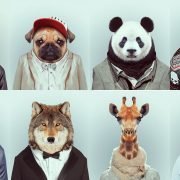Love Animals? Then Quit Fast Fashion
If animals could speak, they would probably say something like “please don’t wear that.” And it’s not because they are activists and want to save the environment or protect human rights, but because they want to save themselves too.
We may not realize it, but our beauty and fashion choices directly affect, harm and endanger animals. In recent years, we’ve all grown more conscious about the dark side of fast fashion and probably heard about its negative effect on the environment and the poor working conditions of the people who make these clothes (if you haven’t yet, we strongly suggest you read more about this issue here). Yet, not enough light has been shed on the animals that suffer at the expense of our fashion habits.
So for all you animal lovers out there, here’s an insight on what fast fashion and beauty does to animals and what you can do to avoid it.
Leather, fur and animal skin:
We’ll start with the obvious one that most people already know about but too often ignore. Leather, exotic fur and animal skin fashion products such as shoes, bags, coats and jackets are often associated with superior quality, luxury and an expensive price tag. But as high as we might’ve paid for that ‘luxurious’ item, it’s worth remembering that an animal has had to pay an even higher price for it. In the name of fashion, these animals have to go through forced farming, food deprivation, mistreatment, painful killing methods, and sometimes even being skinned alive. And you probably wouldn’t wish that to even your worst enemy.
What you can do: Buy sustainable leather or vegan leather (mushroom leather and pineapple leather are really making headlines now), opt for faux-fur instead of real fur (although we’re not really enthusiastic about this given that faux-fur is rarely environmentally friendly), or buy recycled, upcycled or secondhand products.
Wool:
This one is a little less obvious especially since wool is usually praised for being a sustainable material. And while it is true that this material can be eco-friendly, it is not always produced in the most ethical manner. Sheep are usually sheared once a year for the purpose of using their wool and this process can be quite painful for them. In Australia, where most of the wool comes from, it is common practice to use a painful and inhumane technique called “mulesing” to try to avoid “flystrike” (a common problem in the Australian climate during the hot months where flies attack sheep). “Mulesing” involves cutting flesh from the sheep’s backside and is often carried out without any painkillers.
What you can do: learn more about which type of wool each brands use and opt for brands that use non-mulesed wool.
Cosmetics:
Animal cruelty doesn’t just exist in the clothing industry but also in the cosmetics industry. A lot of times, those beauty products that you are putting on your face have first been tried and tested on animals first in the most cruel imaginable settings. So do you really want to wear animal blood on your face?
What you can do: There are a lot of cosmetics brands that do not test their products on animals and sell cruelty-free makeup. Choose to support these brands instead and refuse to buy beauty products from brands that sell animal-tested products.
Micro-fibers:
Fashion is the second most polluting industry in the world. And the pollution cycle doesn’t just end after the clothing items have been manufactured and shipped, but carries on every time the item is being washed. When we put our clothes in the washing machine, synthetic microfibers are released while the items are being washed and this debris later ends up in our sea. This directly affects the fish and marine life who end up swallowing those microfibers and therefore disrupting their food chain. The lower the quality of the materials, the more microfibers it shreds while being washed.
What you can do: Skip cheap materials that release more microfibers and instead choose natural and organic material and higher quality products. And this might seem a little odd to you, but wash your clothes less often and only when necessary (denim products for example don’t need to be washed that often).
Cotton Pesticides and Textile Dyes:
Synthetic microfibers aren’t the only fashion related pollutants that end up in the water and disrupt the sea life. Pesticides from cotton farming and the dyes used from textile processing also find a way into our rivers and as a result pollute our waters and the entire food chains, causing large amounts of fish to die every year.
What you can do: Buy organic cotton, eco-friendly products and sustainable materials such as bamboo that do not pollute the environment and water.
As you can see, fashion really isn’t just about you. It’s not just about what you wear, how great you look, how good it makes you feel or how unique your style is. More than often, there are other living beings involved and some of them don’t have a voice of their own to speak up. So don’t let fashion be something shallow that revolves only around your outer beauty and what’s in fashion this season. Let it instead be a choice that reflects your inner beauty and that considers and protects our little furry friends. As we like to say: be kind to animals, they’re the only friends who’ll never share your secrets.
Posted by Dulce Salerno






Stay tuned